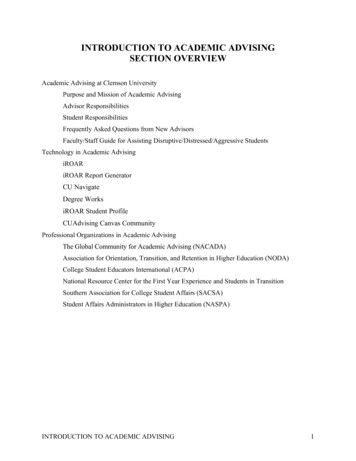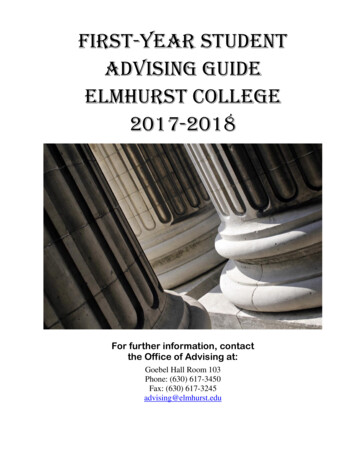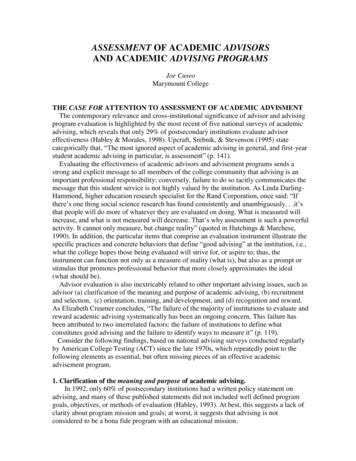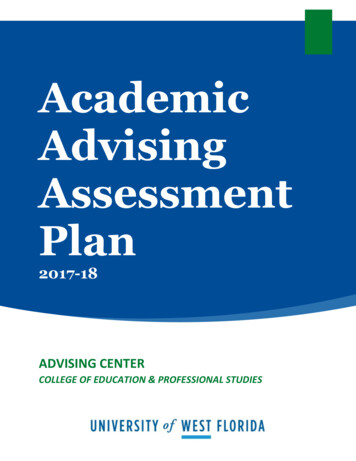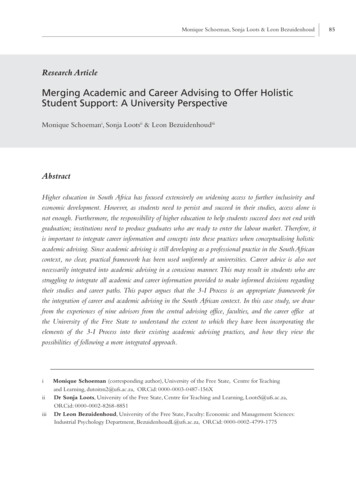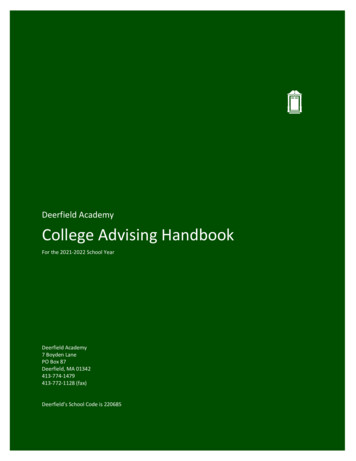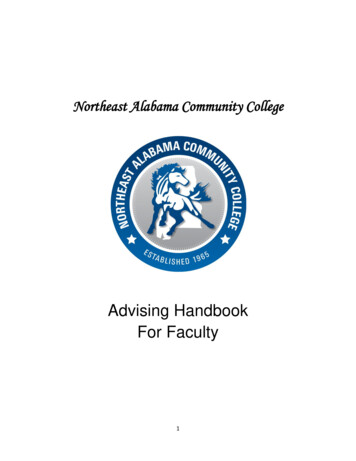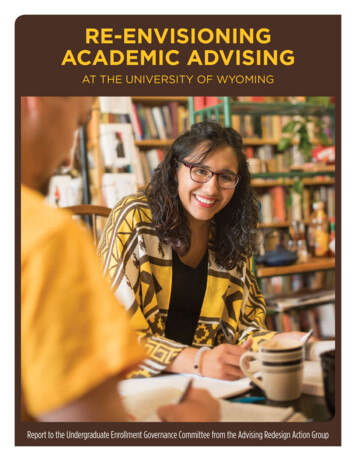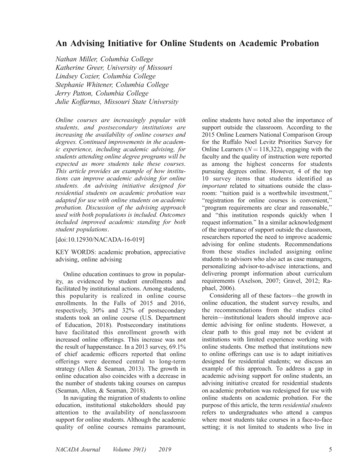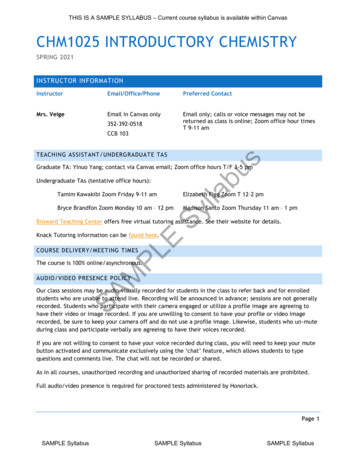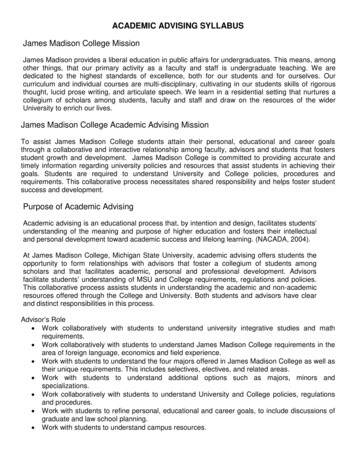
Transcription
ACADEMIC ADVISING SYLLABUSJames Madison College MissionJames Madison provides a liberal education in public affairs for undergraduates. This means, amongother things, that our primary activity as a faculty and staff is undergraduate teaching. We arededicated to the highest standards of excellence, both for our students and for ourselves. Ourcurriculum and individual courses are multi-disciplinary, cultivating in our students skills of rigorousthought, lucid prose writing, and articulate speech. We learn in a residential setting that nurtures acollegium of scholars among students, faculty and staff and draw on the resources of the widerUniversity to enrich our lives.James Madison College Academic Advising MissionTo assist James Madison College students attain their personal, educational and career goalsthrough a collaborative and interactive relationship among faculty, advisors and students that fostersstudent growth and development. James Madison College is committed to providing accurate andtimely information regarding university policies and resources that assist students in achieving theirgoals. Students are required to understand University and College policies, procedures andrequirements. This collaborative process necessitates shared responsibility and helps foster studentsuccess and development.Purpose of Academic AdvisingAcademic advising is an educational process that, by intention and design, facilitates students’understanding of the meaning and purpose of higher education and fosters their intellectualand personal development toward academic success and lifelong learning. (NACADA, 2004).At James Madison College, Michigan State University, academic advising offers students theopportunity to form relationships with advisors that foster a collegium of students amongscholars and that facilitates academic, personal and professional development. Advisorsfacilitate students’ understanding of MSU and College requirements, regulations and policies.This collaborative process assists students in understanding the academic and non-academicresources offered through the College and University. Both students and advisors have clearand distinct responsibilities in this process.Advisor’s Role Work collaboratively with students to understand university integrative studies and mathrequirements. Work collaboratively with students to understand James Madison College requirements in thearea of foreign language, economics and field experience. Work with students to understand the four majors offered in James Madison College as well astheir unique requirements. This includes selectives, electives, and related areas. Work with students to understand additional options such as majors, minors andspecializations. Work collaboratively with students to understand University and College policies, regulationsand procedures. Work with students to refine personal, educational and career goals, to include discussions ofgraduate and law school planning. Work with students to understand campus resources.
Assist students in understanding the connection between integrative studies requirements andmajor requirements.Assist students in understanding mission of James Madison College and the Liberal LearningGoals of MSU.Work with students to monitor degree progress.Be available to answer questions, discuss concerns and further explore academic and nonacademic opportunities. (Major Scholarships)Help students in making decisions about their future developmentStudent’s Role Clearly understand their role in this collaborative process. Take responsibility for their education. Actively engage with advisors and seek assistance in the decision-making process. Make their own decisions based on information gathered from various resources. Schedule appointments and foster a solid working relationship with advisors. Actively seek guidance beyond simply scheduling classes. Set realistic goals and review them with advisors.Engaged LearnersMSU strives for its graduates to be engaged both in the classroom and outside of theclassroom. A strong undergraduate education provides breadth and depth. For students,breadth comes from required courses in natural science, social science, writing, arts &humanities and mathematics. Depth comes with a students’ selected major. Learning is a lifelong endeavor and students must develop a broad set of competencies that allow them to excelin all aspects of life while contributing to the advancement of society. As part of this processMSU has created a set of Liberal Learning Goals that all graduates should develop proficiencyin order to be engaged contributors to the advancement of society.
Michigan State University - Liberal Learning GoalsA liberal arts foundation enhances the potential that MSU graduates will be outstanding leaders andlife-long learners. These liberal learning goals are intended to provide a framework for students’active engagement in learning both in and out of the classroom. Students who complete anundergraduate degree program at Michigan State University will demonstrate the knowledge,attitudes and skills associated with the following interconnected goals and outcomes:Analytical ThinkingThe MSU graduate uses ways of knowing from mathematics, natural sciences, social sciences,humanities, and arts to access information and critically analyze complex material in order to evaluateevidence, construct reasoned arguments, and communicate inferences and conclusions Acquires, analyzes, and evaluates information from multiple sources Synthesizes and applies the information within and across disciplines Identifies and applies, as appropriate, quantitative methods for defining and responding toproblems Identifies the credibility, use and misuse of scientific, humanistic and artistic methodsCultural UnderstandingThe MSU graduate comprehends global and cultural diversity within historical, artistic, and societalcontexts Reflects on experiences with diversity to demonstrate knowledge and sensitivity Demonstrates awareness of how diversity emerges within and across culturesEffective CitizenshipThe MSU graduate participates as a member of local, national, and global communities and has thecapacity to lead in an increasingly interdependent world Understands the structures of local, national, and global governance systems and acts effectivelywithin those structures in both individual and collaborative ways Applies knowledge and abilities to solve societal problems in ethical waysEffective CommunicationThe MSU graduate uses a variety of media to communicate effectively with diverse audiences Identifies how contexts affect communication strategies and practices Engages in effective communication practices in a variety of situations and with a variety of mediaIntegrated ReasoningThe MSU graduate integrates discipline-based knowledge to make informed decisions that reflecthumane social, ethical, and aesthetic values Critically applies liberal arts knowledge in disciplinary contexts and disciplinary knowledge inliberal arts contexts Uses a variety of inquiry strategies incorporating multiple views to make value judgments, solveproblems, answer questions, and generate new understandings
Academic Advising by year:First-YearTo find out who you advisor is please stop by Room 369 south Case, consult the online,James Madison College Advising Page or check the email that was sent to you by theAssistant Dean in August.Schedule mandatory meeting with academic advisor during fall semester.Complete advising worksheet and bring to meeting with advisor.Review your academic goals with advisor.Review online MSU Academic Programs (MSU web page, use search engine for AcademicPrograms).Know professors contact information including office hours and email.If you are going to miss class or are ill please let the professors know immediately. If there isan extended illness or emergency please contact the James Madison College Director ofAcademic Affairs and your professors. The earlier we address these problems the better wecan provide assistance.Know resources available for extra assistance outside of class time for each of your fallsemester courses. Ask professors.Begin to understand the transition from high school to college is an on-going process thatrequires active engagement and support. Know where to find support.Get to know the Resident Assistant on your floor.Begin to understand your unique learning style and time management.Learn personal responsibility. You are responsible for your academic success.Always attend class – if you miss a class make sure you speak with professor to discuss waysto make up work.Become an active learner inside and outside of the classroom (use campus and collegeresources for academic assistance).Attend programs and activities that will help you to expand your knowledge of your own cultureas well as others, including Intercultural Aide programs, South Neighborhood Black Caucus,PRISM, MRULE or others.Begin to think about other academic interests you may want to explore.Stay organized. Develop a personalized plan to stay organized and know important dates.Attend Career Services programs –develop resume with assistance from Career Servicesconsultant. Network, Network, Network .Attend Study Abroad fairs.Attend JMC Meet the Majors meetings in February.Understand your personal goals and track your progress toward completing these goals.Discuss these with your advisor.Explore co-curricular and extra-curricular activities, including student organizations, ASMSU,intermural sports or groups within the community.Remember registration for second-year will be held in April. Plan to meet with your advisor inFebruary, March or April after you have decided on what Madison major you plan to pursue.High-achieving and interested students should explore major scholarships (Truman, Rhodes,Marshall etc.) If you do not know what these are look them up at nifs.msu.edu.If you plan to add an additional major, minor or specialization not administered by JamesMadison, contact an advisor from that department. (Search the MSU web page for contactinformation)
Second-YearReview the goals you set forth in your first year and reevaluate your four-year academic plan.Review your academic, personal and career goals in light of your first-year experience.Meet with your new advisor. Remember in James Madison you will be reassigned to anadvisor in your primary major.Discuss your goals and degree-planning.What methods course(s) should you take in order to achieve your goals and that match youracademic interests.Review related area requirements.High-achieving and interested students should explore major scholarships (Truman, Rhodes,Marshall etc.) If you do not know what these are look them up at nifs.msu.edu. Begin Trumanapplication. Usually due in late spring.Discuss Field Experience or substitutions such as a Senior Honors Thesis or Study Abroad.Attend Field Experience Orientation meeting.Continue to work with Career Services consultant and attend programs.Begin to assume leadership positions in student organizations.Attend UURAF (the University Undergraduate Research and Arts Forum)Third-YearActively engage with advisors and Director of Field Experience to identify interests, begin theapplication process and clarify the requirements for your internship.If you are studying abroad as a substitution for your field experience make sure forms havebeen submitted.If you are substituting a senior honors thesis, begin to discuss plans with your professor andenroll for independent study.Continue to attend Career Services events and meet with Field Career Consultant.Stays involved in extracurricular or civic engagement programs and/or begin your owninitiatives.Consider conducting academic research for presentation at UURAF or another conference.High-achieving and interested students should begin applications for Rhodes, Marshall,Mitchell and other major awards.If you are planning to attend law school or graduate school you should meet with professors toask if they would be willing to write strong letters of recommendation.Prepare for LSAT or GRE if you are planning to attend graduate or law school.Meet with your advisor to make sure you are making progress toward completing your degree.Fourth-YearMeet with advisor to review degree progress.Meet with Assistant Dean to check degree requirements.Complete graduation application.Continue meeting with Field Career Consultant.Finish any outstanding assignments for MC 400 and MC 401 (Field Experience).Review Degree Navigator for any discrepancies. Remember related areas are notautomatically uploaded to Degree Navigator so please contact the Assistant Dean.Know how to:
Use Degree Navigator (degnav.msu.edu)Use STUINFOUse ANGELUse Desire2Learn (D2L)Use the online Academic Programs Catalogue (on the Registrar’s Office website)Use MSU’s online Academic Calendar (on the Registrar’s Office website)Use transfer.msu.eduUse Schedule of Courses, including Schedule Builder and Schedule GeneratorKnow how to add/drop courses and deadlines (In Schedule Builder, click on course sectionnumber for this information)Use the Madison online class waitlist (Madison classes only). Go to JMC home page, click onCurrent Students and then Class Waitlist. Include all required information.Sign-up for My Spartan Career at http://careernetwork.msu.edu/my-spartan-careerUse the “people finder” search box on the MSU homepage to find contact information for staff,faculty, and students.For adding majors, minors and specializations not administered by James Madison College,please contact the advisors for that program. Use the search box on the MSU homepage tofind contact information for departments and advisors.For changing majors: Changing majors out of James Madison requires a visit to the Office ofAcademic Affairs, Room 369 South Case Hall.Review before every advising appointment: Degree Navigator Degree Requirements Your list of questions
Steps for First Year SuccessStep 1: Get to Know Your Professors –Make it a point to introduce yourself to each professor at the beginning of each semester. Stand out from thecrowd by telling the professor a little bit about yourself so that they can remember you—why you choseBentley, why you chose the course, or what you thought about the first reading assignment.Go to your professors’ office hours. Each professor should have their office hours listed in the syllabus.Office hours are your opportunity to get to know the professor outside of the class- room, get extra help, ortalk about your interest in a particular career field.When you go to office hours, it also shows the professor that you are not only interested in theircourse, but you’re putting effort into their course. This may really help you later on if you are havingdifficulty in the course, or in the future when you need a recommendation letter or reference for a campusleadership opportunity—or even your first job!Step 2: Set Goals for YourselfIt is difficult to be successful if you do not know exactly what you aretrying to achieve. Take time at the beginning of the semester to setgoals for yourself—both short-term and long- term goals.WRITE YOUR GOALS DOWN!Be sure to revisit your written goals often throughout your academiccareer, and rewrite your goals as necessary.Need help achieving your goals? There are a multitude of campusresources to assist you: Tip: Being a full timestudent is like having afull time job. Theamount of time youspend on youracademics—being inclass, studying, doingwork, etc. should up toabout 40 hours perYour Academic AdvisorJMC Career ServicesYour ProfessorsJMC Internships OfficeStudent ActivitiesMSU Center for Service Learning and Civic EngagementAnd more! Just ask your adviser.Adapted from 2009 Bentley College Academic Advising Workbook
Step 3: Look at the Big Picture!Each syllabus you receive from a professor is aroad map to your semester. Inside the syllabusyou will find what you are responsible foraccomplishing during the semester—whichincludes homework, quizzes, tests, projects,presentations, and writing assignments and theirdue dates.Enter each due date or deadline from each syllabus in a calendar or planner. That way, youcan see your semester at a glance, and look at“the big picture.” This strategy can help you stayorganized for the semester and use “down time” inthe semester to prepare for busy times in thesemester.Then, go through each week and set aside timefor studying, working on assignments, going tothe library, etc. and enter these times in yourcalendar. If you have down time in betweenclasses, set aside that time for studying. For example, if you do not have class until 11:20am onTuesdays, use the morning to review notes and getahead on your work for the week. The moreproductive you are during the weekdays, the morefree time you will have on the weekends.Step 4: Get a Game PlanOne of the biggest differences between high schooland college is that in college you are responsiblefor determining how to use your time—when yousleep, when you eat, when you study, etc. Withouta game plan for how to use your time, it might bedifficult to stay on track with your homework andother commitments.After you enter the major deadlines and duedates of the semester in your calendar orplanner, enter your daily commitmentsthroughout the semester. Include when you arein class each day and regularly scheduledmeetings. If you have a job, include your workhours. If you are an athlete, include practices andgames. Plot these time commitments throughoutthe entire semester, as best you can.Step 5: Find a Place to Study While thesemester is still new and fresh, start creatinggood habits—such as scouting out your ownplace to study. You can discuss with yourroommate(s) when would be a good time to useyour room as a place to study. You can also lookfor a favorite spot on campus outside theresidence halls.The key to picking a study spot for yourself is toconsider your study style—do you need a quiet,distraction-free area, such as a private study roomin the library? Or do you need people around you,such as the couches and chairs in Smith? Whatkind of lighting do you need to read comfortably?Try a few places on campus, and see what worksbest for you—then, go to this spot regularly forstudying.* Using the same study spot may help you be morefocused and productive while you are studying—see if this works for you!Helpful hints for creating the ultimatestudy space:Limit distractions by turning off your cellphoneTurn off your computer unless you need itto complete the workIf you are using your computer, turn offAIM and do not even start checking Facebook, email, or your favorite websitesBring drinks and snacks—you can’tconcentrate if you’re thinking about food!Take breaks! Take a walk, stretch, go outside—do whatever you need to do to keepyour mind fresh and alert.Meet up with friends for a meal, to watchTV, or play a video game after you havemade some progress in your studying andhomework—use what you like to do as amotivator for getting your work done!Adapted from 2009 Bentley College Academic Advising Workbook
What should you do if You are having difficulty keeping up?You are having difficulty understanding course content?You are having difficulty with homework or taking tests?There are many academic support services available to you.Below are ways you can seek help if you hare having academic difficulty.Meet with your professor.Your professor may be able to provideadditional help during office hours and be ableto refer you to helpful resources.Best advice:Do not be afraid toreach out for helpwith your academics,and don’t wait untilits too late.For academic support to be successful,you need resourcesand time to developskills in the class.Go to the MSU Learning Centerfor your course.Most MSU courses outside of Madison haveLearning Resource Center resources available tohelp you with homework assignments and quickquestions related to the course material. Visittheir website: http://lrc.msu.edu/Meet with an Academic AdviserAn Academic Adviser can help you developstrategies for time management and study skillsand help you identify other key campusresources.Request a tutor.One-on-one peer tutoring is available to studentswho are attending class regularly, but needassistance beyond what the Learning Centerscan provide. Visit their website for moreinformation: http://lrc.msu.edu/Meet with someone from theResource Center for Personswith Disabilities.You may be eligible to receive accommodations if you have a learning disability. For more information,call 517Adapted from 2009 Bentley College Academic Advising Workbook
University to enrich our lives. James Madison College Academic Advising Mission . To assist James Madison College students attain their personal, educational and career goals through a collaborative and interactive relationship among faculty, advisors and students that fosters student growth and development.
